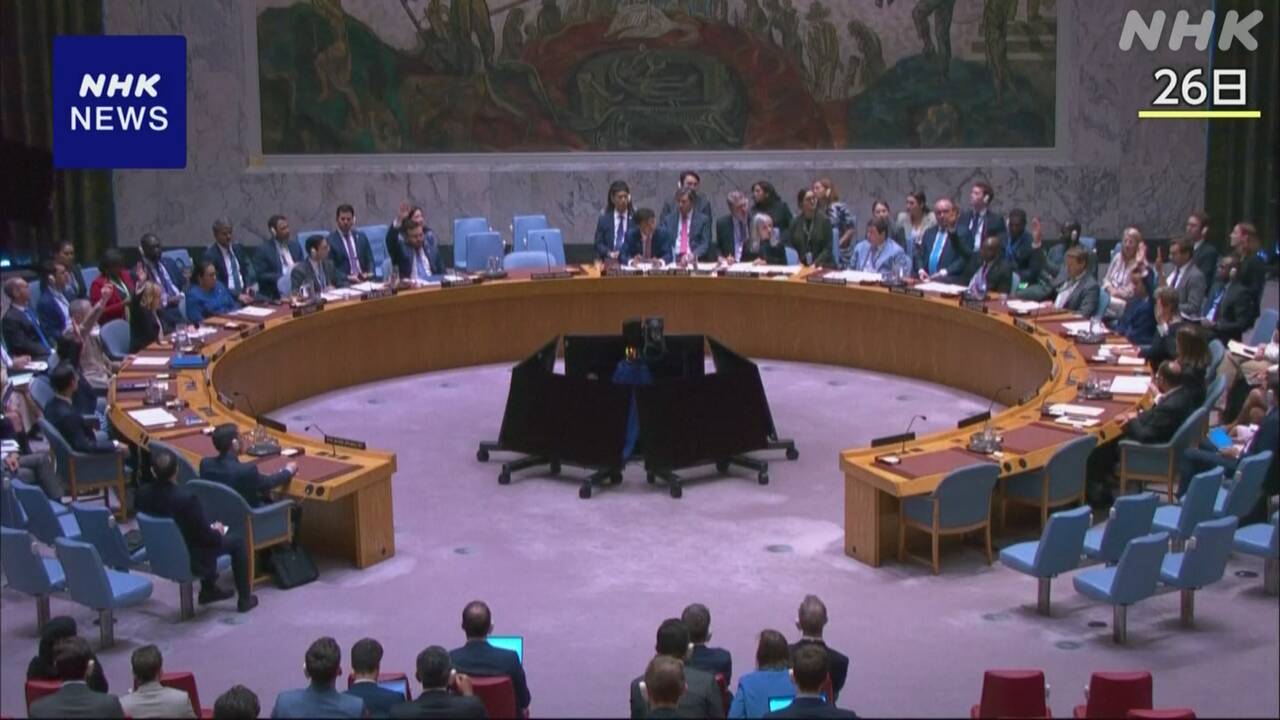Published: 2025-09-28 11:01
イランへの国連制裁 28日再発動 欧米側との対立深まること懸念

イランの核開発をめぐる国際的な合意にイランが違反したとして、2015年に解除されていた国連の制裁が28日、再び発動されました。イランの核開発は一層制限されることになり、欧米側との対立がより深まることが懸念されます。
イランに対する国連の制裁は2015年に欧米などとの間で成立した「核合意」で、解除されていましたが、イギリス、フランス、ドイツは、イランがその後、合意に反して核開発を進めたとして、先月28日、制裁の発動に向けた手続きを始めていました。
制裁回避のためには、30日以内に国連の安全保障理事会で決議を採択する必要があり、26日にはロシアと中国が提出した決議案の採決が行われましたが否決されました。
これにより、イランに対する国連の制裁は、日本時間の28日午前9時に再び発動されました。
制裁の発動で、イランはウラン濃縮活動の停止が求められ、核開発は一層制限されるほか武器の取り引きなども制限されます。
イラン政府はIAEAへの協力を停止する考えを示すなど強く反発し、国内の強硬派からはNPT=核拡散防止条約からの脱退を求める声も上がっていて、欧米側との対立がより深まることが懸念されます。
| # | 言葉 | 意味 |
|---|---|---|
| 6 | 制裁 | せいさい (制裁) : sanctions; punishment |
| 5 | 核 | かく (核) : 1. stone (of a fruit); pit; pip 2. core (of an organization, team, etc.); nucleus; heart |
| 4 | 開発 | かいはつ (開発) : development; exploitation |
| 4 | 国連 | こくれん (国連) : United Nations; UN |
| 4 | 発動 | はつどう (発動) : 1. putting into operation 2. invocation |
| 3 | 合意 | ごうい (合意) : (coming to an) agreement; consent; mutual understanding; accord; consensus |
| 3 | 制限 | せいげん (制限) : restriction; restraint; limitation; limit |
| 3 | 欧米 | おうべい (欧米) : Europe and America; the West |
| 2 | 解除 | かいじょ (解除) : cancellation; rescinding; release; calling off; lifting (sanctions); delisting |
| 2 | 再び | ふたたび (再び) : again; once more; a second time |
| 2 | 一層 | いっそう (一層) : 1. much more; still more; all the more; more than ever 2. single layer (or storey, etc.) |
| 2 | 対立 | たいりつ (対立) : confrontation; opposition; antagonism |
| 2 | 深まる | ふかまる (深まる) : to deepen; to heighten; to intensify |
| 2 | 懸念 | けねん (懸念) : worry; fear; anxiety; concern |
| 2 | 対する | たいする (対する) : 1. to face (each other); to be facing 2. to be directed toward (the future, etc.); to be in response to; to be related to |
| 2 | 停止 | ていし (停止) : 1. stoppage; coming to a stop; halt; standstill 2. ceasing (movement, activity, etc.); suspension (of operations); interruption (e.g. of electricity supply); cutting off |
| 2 | 求める | もとめる (求める) : 1. to want; to wish for 2. to request; to demand; to require; to ask for |
| 1 | めぐる | めぐる (巡る) : 1. to go around 2. to return |
| 1 | 国際的 | こくさいてき (国際的) : international |
| 1 | 違反 | いはん (違反) : violation; offense; offence; breach; transgression; infringement; contravention |
| 1 | 成立 | せいりつ (成立) : 1. formation; establishment; materialization; coming into existence 2. conclusion (e.g. of a deal); reaching (e.g. an agreement); approval; completion; closing; enacting; arrangement |
| 1 | 反する | はんする (反する) : 1. to be contrary to; to be inconsistent with; to contradict 2. to act contrary to (rules or guidelines); to violate; to transgress |
| 1 | 進める | すすめる (進める) : 1. to advance; to move forward; to put (a clock, watch) forward 2. to carry forward (plans, work, etc.); to proceed with; to make progress in; to further; to advance; to hasten; to speed up |
| 1 | 向ける | むける (向ける) : to turn towards; to point |
| 1 | 手続き | てつづき (手続き) : procedure; process; proceedings; formalities |
| 1 | 回避 | かいひ (回避) : evasion; avoidance |
| 1 | 安全保障理事会 | あんぜんほしょうりじかい (安全保障理事会) : (UN) Security Council |
| 1 | 決議 | けつぎ (決議) : resolution; vote; decision |
| 1 | 採択 | さいたく (採択) : adoption; selection; choice |
| 1 | 中国 | ちゅうごく (中国) : 1. China 2. Chūgoku region of western Honshu (incl. Okayama, Hiroshima, Shimane, Tottori and Yamaguchi prefectures) |
| 1 | 提出 | ていしゅつ (提出) : presentation (of documents); submission (of an application, report, etc.); production (e.g. of evidence); introduction (e.g. of a bill); filing; turning in |
| 1 | 決議案 | けつぎあん (決議案) : resolutions |
| 1 | 採決 | さいけつ (採決) : vote; ballot; division |
| 1 | 行う | おこなう (行う) : to perform; to do; to conduct oneself; to carry out |
| 1 | 否決 | ひけつ (否決) : rejection; negation; voting down |
| 1 | 日本 | にほん (日本) : Japan |
| 1 | ウラン濃縮 | ウランのうしゅく (ウラン濃縮) : uranium enrichment |
| 1 | 活動 | かつどう (活動) : 1. activity (of a person, organization, animal, volcano, etc.); action 2. movie (esp. during the silent movie period) |
| 1 | 武器 | ぶき (武器) : 1. weapon; arms; ordnance 2. weapon (something used to gain an advantage); asset |
| 1 | 取り引き | とりひき (取引) : transactions; dealings; business |
| 1 | 協力 | きょうりょく (協力) : cooperation; collaboration |
| 1 | 考え | かんがえ (考え) : 1. thinking; thought; view; opinion; concept 2. idea; notion; imagination |
| 1 | 示す | しめす (示す) : 1. to (take out and) show; to demonstrate; to tell; to exemplify; to make apparent 2. to point out (finger, clock hand, needle, etc.) |
| 1 | 反発 | はんぱつ (反発) : 1. opposition; rebellion; revolt; resistance; backlash; refusal 2. rebounding; recoiling; repulsion |
| 1 | 国内 | こくない (国内) : internal; domestic |
| 1 | 強硬派 | きょうこうは (強硬派) : hard-liners; diehards; hawks |
| 1 | 核拡散防止条約 | かくかくさんぼうしじょうやく (核拡散防止条約) : Treaty on the Non-Proliferation of Nuclear Weapons; Nuclear Non-Proliferation Treaty |
| 1 | 脱退 | だったい (脱退) : withdrawal (e.g. from an organization); secession; leaving; pulling out |
| 1 | 上がる | あがる (上がる) : 1. to rise; to go up; to come up; to ascend; to be raised 2. to enter (esp. from outdoors); to come in; to go in |